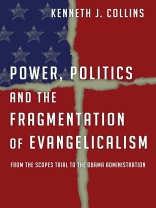Kenneth J. Collins tells the narrative history of the political and cultural fortunes of American evangelicalism from the late nineteenth century through the contemporary era.He traces the establishment of the evangelical enterprise in American culture and its influences on the political and social values of the American landscape throughout the twentieth century, as well as its fragmentation into competing ideological camps. Underlining how both sides of the liberal-conservative divide have diluted their message through political idioms, Collins suggests a way forward for evangelical political identity that avoids the pitfalls of fundamentalism and liberalism.Will American evangelicalism outlive its partisan history? As Kenneth Collins tells the story, there is reason to think so.
สารบัญ
Introduction
1. Cultural Shifts, the Rise of Fundamentalism and the Great Reversal
A Cultural Legacy
The Progressive Movement and the Great War
Cultural Challenges to the American Protestant Empire
Immigration
Intellectual Challenges to the American Protestant Empire
Higher Criticism of the Bible
Evolution
The Scopes Trial
The Wesleyan and Pentecostal Difference
The Social Gospel
The Great Reversal
The Fundamentalist Dilemma
2. Fundamentalism, Neo-Evangelicalism and the Search for Power
The Great Depression and Its Aftermath
The New Deal
The Shifting Theological Context
The Rise of the Neo-Evangelicals
The Infrastructure of Neo-Evangelicalism
The National Association of Evangelicals
Christianity Today
Fuller Theological Seminary
The Ministry of Billy Graham
The Popularity of Religion and the Threat of Communism
Wesleyan Evangelicals Coalesce
The Civil Rights Movement
3. Evangelicals, the Religious Right and the Moral Life of the Nation
The Great Society and an Activist Supreme Court
Social Action and the Young Evangelicals
Watergate and the Election of an Evangelical President
The Rise of the New Religious Right
The Christian Coalition
Culture Wars
Wesleyan Evangelicals and the Religious Right
Evangelicals and Catholics Together
Conservative Evangelicals and the Republican Party
4. Evolution, Intelligent Design and the Transformation of Culture?
The Scopes Trial Revisited?
Evolution as Neo-Darwinism
Theistic Evolution
Leading Wesleyan Evangelicals (and Others) Debate Theistic Evolution
Neo-Darwinism as a Sufficient Explanation
Intelligent Design
A Working Definition of Intelligent Design
The Intellectual Strategy of Intelligent Design
Intelligent Design’s Critique of Mutation and Natural Selection
Michael Behe and Irreducible Complexity
William Dembski and Complex Specified Information
Making Way for Doubt and Ambiguity: Laughlin, Anderson, Himmelfarb and Berlinski
Methodological Naturalism and the Wedge
Methodological Discipline?
Metaphysical Naturalism
The Cultural Strategy of Intelligent Design
The Supreme Court and Evolution
The Judiciary Declares Intelligent Design a Religion and Defines Science
5. The Resurgence of the Evangelical Left
The Rise of the Evangelical Left
The Politics of the Evangelical Left
Jim Wallis
Tony Campolo
Brian Mc Laren
Jimmy Carter
The Housing Crisis as a Case Study in Political Mischief and Confusion
Leftist Political Philosophy and the Modern Democratic State
Where the Evangelical Left Falters
The Manhattan Declaration
The Evangelical Left Falters Again
6. Beyond Ideology: The Renewal of Catholicity and the Development of an Evangelical Political Philosophy
The Rise of Barack Obama
The Public Voice of the Church
Yoder to the Rescue?
Come to Church and Get Alienated
The Challenges of the Modern Liberal Democratic State
A New Kind of Secularism
Revisioning Separation of Church and State
People of Faith as Second Class Citizens
Separation of Church and State Has Become Separation of Church and Culture
The Priority of the Church or Democracy?
What?s an Evangelical to Do?
The Beginnings of a Political Philosophy
Conclusion
What Kind of Power?
เกี่ยวกับผู้แต่ง
Kenneth J. Collins (Ph.D., Drew University) is professor of Historical Theology and Wesley Studies at Asbury Theological Seminary. He has published several books including The Theology of John Wesley (Abingdon, 2007), The Evangelical Moment (Baker, 2005) and John Wesley: A Theological Journey (Abingdon, 2003).







![ปกของ Brian Schrag & Julisa Rowe: Community Arts for God's Purposes [Chinese] 貼近神心意的社群藝術 ปกของ Brian Schrag & Julisa Rowe: Community Arts for God's Purposes [Chinese] 貼近神心意的社群藝術](https://static.worldofdigitals.com/thumb_webp/740/9781645083740.webp)




